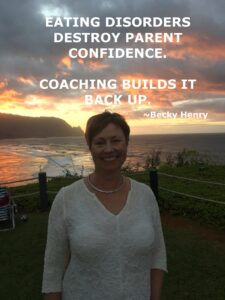
 Family caregivers receiving support is a factor in treatment outcomes. We finally have research showing that treatment outcomes improve when caregivers have support!
Family caregivers receiving support is a factor in treatment outcomes. We finally have research showing that treatment outcomes improve when caregivers have support!
Check out this research link from 2021:
Sheetal Patel , Autumn Shafer , Jane Brown , Cynthia Bulik & Nancy Zucker (2014) Parents of Children With Eating Disorders: Developing Theory-Based Health Communication Messages to Promote Caregiver Well-Being, Journal of Health Communication, 19:5, 593-608, DOI: 10.1080/10810730.2013.821559 PDF in my google drive: https://drive.google.com/drive/folders/0Bwo4EXZS2LxALXJDUUktU05fVzQ?resourcekey=0-paoQBLFAjXePK2ihKr_C1Q
If you don’t have time to read it all, here are some key quotes in my humble opinion from this research: “Research suggests the development and maintenance of adaptive coping behav-
iors (often called self-care) can ultimately aid in a child’s recovery because parents will be energized, confident, and better able to participate in recovery (e.g., Kyriacou,Treasure, & Schmidt, 2008; Sepulveda, Lopez, Todd, Whitaker, & Treasure, 2008; Zucker, Ferriter, Best, & Brantley, 2005). Examples of effective adaptive coping behaviors include participating in parent skills groups, taking personal time away from care-giving (e.g., reading, walking, sleeping, meditation), and talking to supportive others (e.g., partner, friend, personal therapist).”
To celebrate the 5th Anniversary of the launch of the HUG Kits, I’m sharing tips from the 10 Topics covered. Today, the third topic from this 10 part video series and downloadable guidebook is on “Support.”
The goal for this chapter topic is: SUPPORT
Most family caregivers don’t get enough “Support” during a loved one’s illness. The goal I’ve stated in the Support chapter is; “To create follow-through and accountability for the self-care, support structure and boundaries you hopefully laid out in the “Oxygen” chapter pages of your downloadable guidebook.”
 HUG Kit Cover
HUG Kit CoverHere are 3 components from the “Support” chapter in the HUG Kit Guidebook:
- What structures will you put into place to help you get in the habit of practicing self-care daily?
- Who are people whom you can call on for support and what are the tasks they can do?
- What may get in your way of practicing self-care, calling support people & following through on boundaries?
One of the resources from the “Support” chapter I’d like to share with you is an article I wrote: Three Reasons to Set Firm Boundaries & Enforce Them
I hope you are able to enjoy some spring weather soon where you are and want to remind you all that the next Monthly Free Group Phone Support is coming up April 3rd. Just email me if you or someone you know would like to participate and I will send the dial in info. There is info on my website under Group Support Options
Many families are not able to access the 1:1 and small group support. Making the support more accessible to more folks at a very reasonable rate, is why I created the HUG Kits and launched them in 2019! Families can buy them directly from my website and if clinicians wish to provide them for the families of your clients, you can easily provide them as an Affiliate for no cost to you the provider and at a discount to your families. My info is all at the bottom of this email.
The HUG Kits provide 3 powerful resources to help family caregivers become a calm, compassionate, confident caregivers.
- A Physical Copy of Just Tell Her To Stop: Family Stories of Eating Disorders.
- Link to 10 Videos – 10 essential, specific, powerful tools for coping.
- PDF Guidebook – deepen learning on the 10 essential, specific, powerful tools for coping by writing plans to take action and move forward.
The 10 Topics covered are:
- Emotions

- Oxygen
- Support
- Education
- Communication
- RTC – Residential Treatment Centers
- Self Care
- Enabling
- Validate, Listen, Acknowledge
- Boundaries
For more support for caregivers and this topic, visit beckhenry.com
If you or a family you know of are having a hard time right now, please reach out about our support services for families. As I’ve said since 2003, “No one should have to do this alone.” And I’m glad to see others saying that now and families need the support to help loved ones through this difficult time.
Take care,

